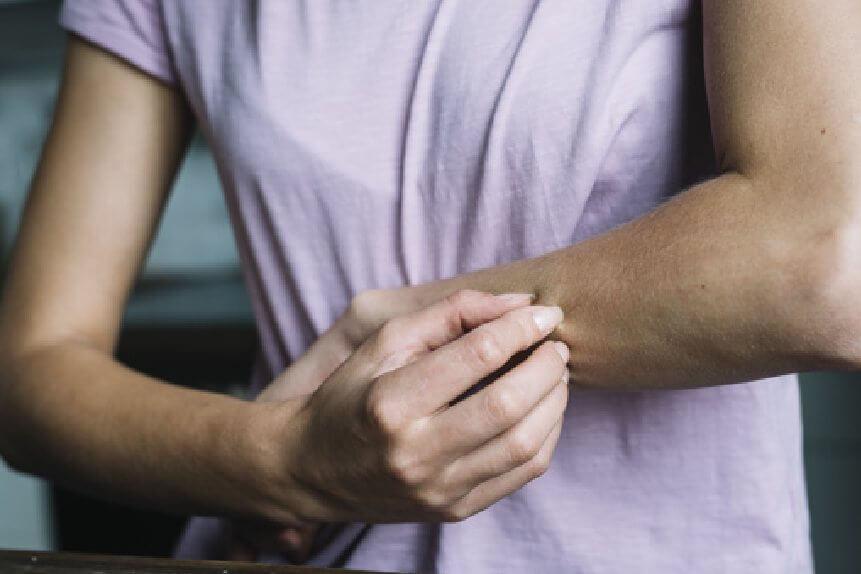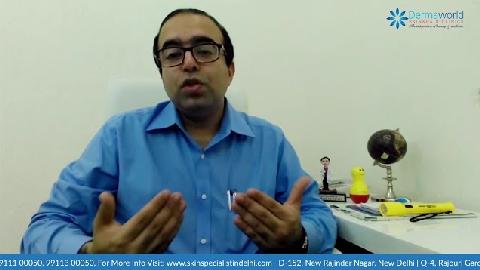
Factors and Symptoms associated with skin allergic conditions:
- Swelling.
- Inflammation.
- Itching.
- Redness.
- Irritated skin.
- Raised bumps.
- Cracked skin.
- Leathery skin.
- Scaling or flaking of skin.
Best Skin Allergy Specialist in Delhi
Allergies are the overreaction or hypersensitive responses of the immune system towards a particular substance (allergen). An allergen can be any material such as pollen, dust, animal dander, bee venom, food, proteins, steroids, drugs, dairy products, sunlight, cosmetics, and poison ivy. Skin allergies can be caused by a variety of factors, that result in an itchy rash, which can be red, painful, and bumpy. These rashes can occur anywhere on the body, as soon as the triggering factor or allergen comes in contact.
Skin allergies are sometimes also termed contact dermatitis as the allergic responses occur when an allergen comes in contact with the physical barrier (skin) or enters inside the body. Then the body’s immune system releases certain chemicals, namely histamines that cause allergy symptoms.
Sometimes skin rashes can also occur in illness caused by certain diseases such as chickenpox (causative agent: varicella-zoster virus) or measles. A skin specialist can help to determine the allergic skin condition, and help to develop a treatment plan to improve this skin condition.
Dr. Rohit Batra’s DermaWorld Skin Institute provides the best line of treatment for Skin Allergy in Delhi. The treatment provided by skin expert Dr. Rohit Batra helps treat inflammation and irritation in the skin without affecting the immune or adrenal system.
Note: Various factors contribute to skin irritations, including heat, medications, infections, and immune system disorders. When an allergen is accountable for triggering an immune system response, the irritation is an allergic skin condition. Allergic contact dermatitis occurs when the skin comes in direct contact with an allergen.
For example, if one is allergic to nickel and skin comes in contact with nickel-made jewelry, then skin may become scaly, itchy, swollen, and bumpy at the point of contact.
Several skin allergies and rashes cause itching, however, not all rashes that itch are related to skin allergies. Dr. Rohit Batra’s DermaWorld Skin Institute, the best skin allergy clinic in Delhi provides treatment for all kinds of skin allergies. Skin laser treatment in Delhi is offered with the help of advanced techniques and methods by the Best Skin Specialists.
Treatment
Dr. Rohit Batra, a Skin Allergy Specialist in Delhi at DermaWorld Skin Institute can help determine the trigger. The doctor conducts a physical examination, and also asks certain questions about the skin products the patient uses.
- Prick test (skin allergy test), skin test, blood tests are done to determine the skin allergy-triggering factor or agent.
- It is recommended to know the triggering factors and avoid any further exposure to them.
- Take preventive medicines such as antihistamines, apply anti-itch medications, topical corticosteroids to manage the symptoms and reduce swelling and inflammation. But these must be used only after a certified skin specialist’s prescription.
- Moisturize the skin and keep it hydrated. Avoid hot showers or baths.
Skin allergies can cause irritating symptoms and are often bothersome. It is necessary to consult a dermatologist or skin specialist to identify the right treatment plan to get the skin allergies under control.
Book An Appointment
ALL CLINICS CLOSED ON SUNDAY
The Following are the Most Common Allergic Skin Problems:
1. ATOPIC DERMATITIS (ECZEMA)
The term “eczema” is derived from a Greek word that means “to boil over”. It is a chronic skin condition in which red, itchy, scaly, inflamed, dry, and leathery patches appear on the skin. It mostly affects infants and adults and can occur at any point in life. Eczema is often accompanied by hay fever or asthma. Eczema can affect all parts of the body and sometimes family history, stress, and certain environmental factors are responsible for causing eczema.
Eczema can be mild, moderate, severe, and symptoms may differ according to the type of eczema. It is not a contagious disease, and oral medications, light therapy, ointments, over-the-counter (OTC) remedies, immunosuppressants, and certain steroids can help to treat eczema.
In infants, the rash can appear on the chest, cheeks, and scalp, where the child scratches. Adults can have the rash in the skin folds of the elbows, behind the knees, and also on the neck, hands, feet, and back.
2. URTICARIA (HIVES)
It is a type of skin inflammation, in which the red, itchy, raised and bumpy areas appear on the skin. This condition occurs when the immune system releases histamines as it encounters certain allergens (insect sting, sunlight, medications). Hives can appear anywhere on the body, such as the face, throat, ears, tongue, and so on. Acute hives go away in a few days but chronic hives can come and go for months or years. Chronic hives may be caused because of hepatitis, cancer, thyroid, and infection. To get the best treatment for urticaria or hives in Delhi Visit Dr. Rohit Batra’s DermaWorld Skin Institute.
3. ANGIOEDEMA (SWELLING)
It is characterized by deep swelling around the lips, throat, lungs, eyes, and sometimes also in the hands, feet, and genital areas. If angioedema occurs in the lungs and throat, it causes difficulty in breathing and can be life-threatening.
4. CONTACT DERMATITIS
It is a reaction that occurs when the skin comes in contact with an irritant or allergen. Red itchy bumps and rashes occur on the skin. The allergens include metals (jewelry, alloys, and steel items), nail paints, plants, latex gloves, detergents, shampoos, soaps, plants, medications, certain chemicals, and many more.
In many cases, sunlight also acts as an intermediate to an allergic reaction. When the skin (applied sunscreen, lotion, cosmetics, serum, perfumes) is exposed to sunlight, skin irritation and allergic responses take place.
A skin test is performed to determine the major cause of the problem. The best method to prevent contact dermatitis is prevention from what causes a rash and try to avoid it.
Don’t scratch, and try to resist it. Antihistamines, cold compress, oatmeal bath, hydrocortisone creams are prescribed to get relief from itching.
* Insect stings can also cause various skin problems or rashes and present with the following symptoms:
• Redness and edema at the sting site.
• Anaphylaxis (that causes a drop in blood pressure, weak pulse, nausea, and vomiting).
• Shortness of breath.
• Itching and burning sensation.
• Chest tightness.
• Wheezing and cough.
• Hives all over the body.
* Genetic factors are also sometimes responsible for causing asthma, allergies, eczema, and hives.
HAIR DYE ALLERGY
This kind of skin allergy is also very popular. It happens due to PPD found in Hair Dye or ammonia found in hair color.
ITCHING WITHOUT A RASH
It’s a common problem that itching may happen without any rash being present. When itching is limited to a certain area of the body, the most likely reason is a disease limited to the skin. The area of the body that itches often gives a big clue about the cause of the itching.
HAVING AN ALLERGY CAN ALSO RISK IN THE OCCURRENCE OF CERTAIN OTHER MEDICAL CONDITIONS SUCH AS
• Sinusitis and infection of lungs and ears.
• Secondary fungal or bacterial infection.
• Asthma affects the airways and breathing.
WAYS TO MANAGE ITCHING FROM SKIN ALLERGY
• Avoid scratching.
• Take frequent bath and apply natural skin-friendly moisturizer.
• As prescribed by the skin specialist, apply creams, ointments and take oral medications (antihistamines).
Allergies can also occur due to seasonal changes, sinus, flu, or congestion. To learn about Skin Allergy Treatment Cost in Delhi please feel free to visit DermaWorld Skin Institute located in Rajouri Garden, New Delhi.
Frequently Asked Questions
Itchy skin, redness, bumps, rashes, scaling cracked skin, and blisters on the skin are some of the common symptoms of skin allergy, which usually happen due to reaction to an irritant. Common types of skin allergies include Eczema, Contact dermatitis, Urticaria (Hives), and more.
There are several factors responsible for causing skin allergy; some of them include:
- Contact dermatitis: It occurs when the skin reacts to something that comes in physical contact.
- Medications: Certain medications can be responsible for causing rashes as side effects of allergic reactions to the skin.
- Infections: Sometimes, infections by viruses, bacteria, or fungi can also cause a rash on the skin.
- Autoimmune condition: It generally happens when the immune system of the body starts attacking healthy tissues of the body resulting in the occurrence of rashes on the skin.
- Contact with allergen: Cold or hot temperatures, pollen, sunlight, water, insects are some of the factors that can cause skin allergy.
Yes, an individual may develop a skin allergy such as rash, redness, itchiness, swelling after eating a particular food. Some of the foods that can cause an allergic reaction include milk, eggs, fish, nuts, peanuts, wheat, soy. Most of the times, food allergies are often detected during childhood as a result of any adverse reaction to a particular food item.
Some types of skin allergies such as rash, scabies, herpes, ringworm, cellulitis are considered as contagious skin infections that can spread from one person to others through physical contact or by using contaminated articles of the infected person.
After properly examining the skin and reviewing the medical history of the patient, the dermatologist suggests various treatments to control skin infection. The dermatologist sometimes also conducts a Prick test that is a type of skin allergy test to check for the triggering factor of allergy in the skin. They may also suggest medicines such as antihistamines, anti-itch medications, topical corticosteroids to manage the symptoms. With it, one should apply moisturizer on their skin to keep the skin hydrated.
There are some measures that can make an individual comfortable during the time of allergy, such as:
- Avoid touching or scratching the itchy areas or rashes as when someone keeps touching their rashes, itchy spots, and then it may trigger more allergic response.
- Take warm water shower that can help to calm down the fiery rash. Then smoothly pat dry the skin and use a moisturizer to keep it hydrated.
- Avoid wearing tight clothes as it may irritate the skin and worsens the signs of an allergic reaction. Instead of wearing tight clothing, always wear comfortable and loose clothes.
- If an individual is noticing persistent signs of allergic reaction and the symptoms are getting worse with each passing day, then one should consult with their dermatologist as negligence at the initial phase can lead to a secondary skin infection. Dr. Rohit Batra is one of the best dermatologists in Delhi, who provides safe and effective skin allergy treatment after proper diagnosis.
Usually, skin allergy is not a serious condition and can be effectively managed by consulting with a qualified dermatologist and taking proper treatment. However, if an individual is noticing that their signs are getting worse day by day or they are not noticing any improvement in their skin condition then they should talk to their dermatologist as it can be a sign of serious skin infection such as hives or a cause of any underlying skin condition.




